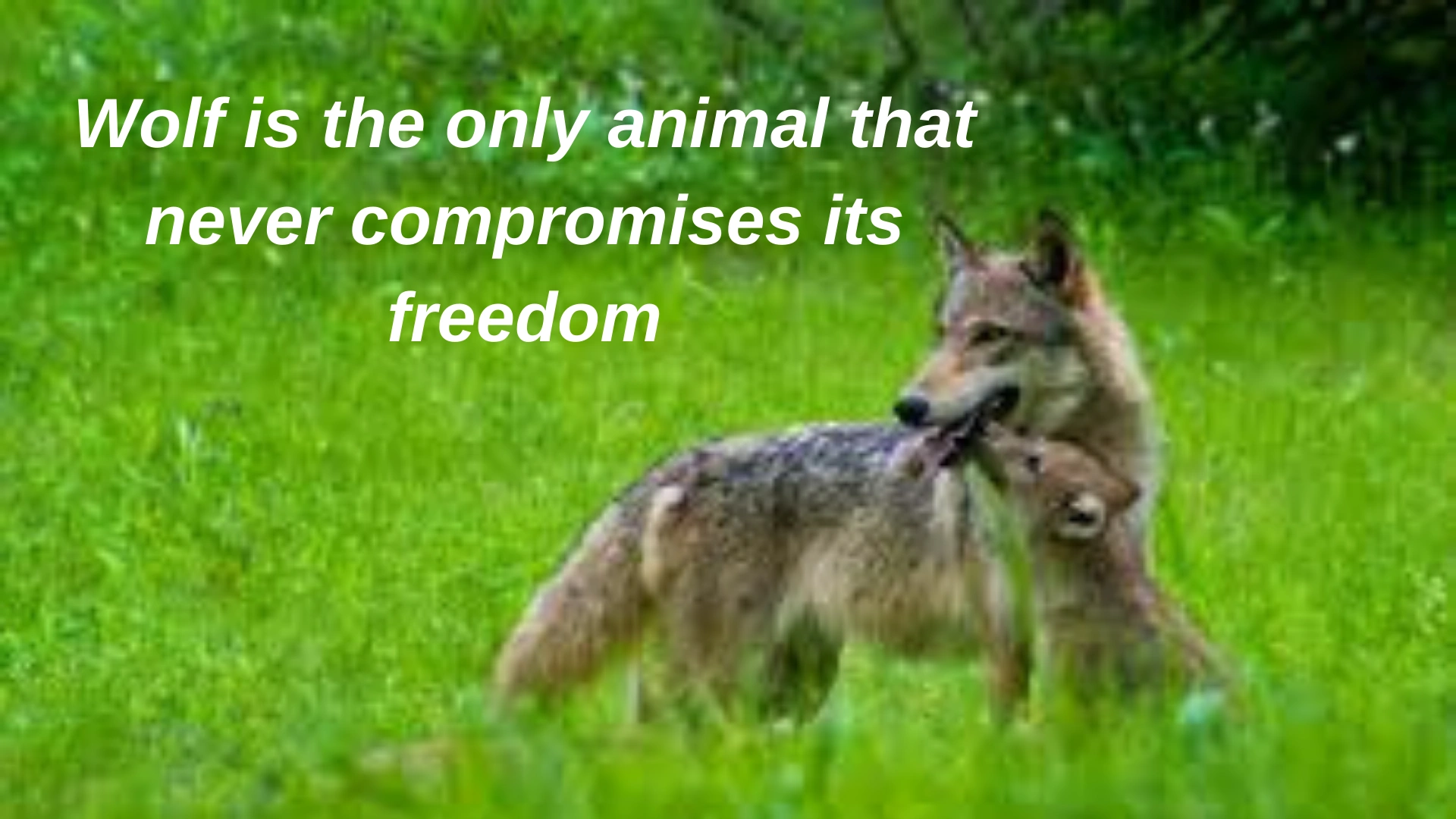Welcome to (International Stories). In this story, we will discuss Wolf is the only animal that never compromises its freedom. I hope you will like this story and understand it.
Wolf is the only animal that never compromises its freedom
Wolf is the only animal that is extremely loyal to its parents. It serves its parents in old age. It is an honorable animal, that’s why tigers compare their offspring to sheep instead of lions
“Wolf” is the only animal that never compromises its freedom and does not become a slave to anyone, whereas every animal, including a lion, can be enslaved…
The wolf never eats the dead and this is the way of the king of the jungle. Nor does the wolf look at the Muharram Mounis (mother, sister) that is, completely different from other animals, wolf does not even look at his mother and sister with lust…
The wolf is so loyal to its spouse that it does not establish a relationship with any other female other than him. Similarly, the female (i.e. her spouse) maintains loyalty to the wolf in the same way…
The wolf delivers its offspring because their parents are the same.
If one of the couples dies, the other stands at the place of death for at least three months as mourning…
The wolf is called “Ibn Al-Bar” in Arabic, meaning “Good Son” because when his parents grow old, it hunts for them and takes care of them completely…
That’s why the Turks compare their children to wolves instead of lions. They believe that
“It is better to be ethnic like a wolf than to be bloody like a lion”
A Wolf’s Journey to Freedom
Once upon a time, deep within the dense forests of a distant land, there lived a noble wolf named Asad. He roamed the woods, known for his strength and intelligence, yet something always tugged at his heart—an unquenchable yearning for true freedom. Though he was free in body, running through the mountains and valleys, his soul felt caged, yearning for something beyond mere survival.
Asad often sat on the highest cliff, staring at the vast horizon, wondering about his purpose. One day, he met an old sage who had once been a shepherd, now living a life of solitude and reflection.
The sage looked deep into Asad’s eyes, sensing his inner struggle. “You seek freedom, don’t you?” asked the sage.
Asad nodded, his amber eyes filled with curiosity. “I run through the forests, hunt, and live freely, yet my heart feels heavy. I long for true freedom.”
The sage smiled, understanding the wolf’s turmoil. “True freedom, Asad, is not found in the forests or in running free. True freedom is found in submission to the Creator. To live in harmony with the world, respecting the balance set by Allah, is where you will find peace.”
The wolf tilted his head, unsure of what the sage meant. “Submission? But I am a wolf, meant to live by instinct and strength. How can submission lead to freedom?”
The sage gestured to the vast forest and said, “Look around you. Everything in creation follows the natural order set by Allah. The sun rises and sets, the rivers flow, the trees grow—all submit to their purpose. You, too, must find your purpose, for true freedom lies in embracing the will of the Almighty.”
Asad pondered these words and realized that while he had been living freely, he had not been living with purpose. He had fought battles with other wolves, hunted endlessly, and roamed aimlessly. But now, he understood that freedom wasn’t just about doing what one wished; it was about aligning one’s will with a higher purpose.
The wolf decided to live in a way that reflected gratitude to the Creator. He hunted only what he needed, treated the other animals with respect, and began each day with the remembrance of Allah’s greatness. Over time, Asad’s heart grew lighter, and the weight of his restless soul began to lift.
One night, while sitting on the same cliff, Asad gazed at the stars, feeling a deep peace he had never known. He now understood what the sage meant—true freedom was found in submission, not to the world, but to the Creator who made it.
With a content heart and a spirit aligned with his purpose, Asad howled a beautiful song into the night, a song of freedom, submission, and gratitude to Allah, the One who had set him truly free.
And from that day forward, Asad lived not just as a free wolf, but as a wolf with purpose, knowing that real freedom came through living in harmony with the will of Allah.
CONCLUSION:
We passage ou’ve shared highlights several attributes attributed to wolves, emphasizing their loyalty, honor, and moral qualities. Here’s a detailed reflection on the moral lessons drawn from these attributes:
Loyalty and Family Values: Wolves are depicted as exceptionally loyal to their pack, including their parents and offspring. They care for their elderly parents and mourn their dead mates, showcasing strong family bonds. This teaches us the importance of loyalty and care within our own families and communities. It emphasizes the value of supporting and respecting our elders and nurturing familial relationships.
Freedom and Integrity: Wolves are said to never compromise their freedom or become slaves to anyone. This underscores the importance of maintaining one’s integrity and independence. It suggests that true strength lies in being true to oneself and not succumbing to external pressures that might compromise one’s values or freedom.
Respect and Chastity: The passage mentions that wolves do not eat dead animals and do not view their family members with lust. This highlights respect for life and emphasizes the importance of purity in relationships. It suggests that true honor includes respecting boundaries and maintaining dignified relationships.
Comparison to Lions and Cultural Perspective: The passage contrasts wolves with lions, suggesting that while lions are often seen as symbols of power, wolves are considered symbols of loyalty and honor. This cultural perspective teaches us that strength isn’t solely about dominance but also about virtues like loyalty and integrity. It encourages us to value these qualities in ourselves and others.
Cultural Symbolism and Ethics: The comparison made by Turks, likening their children to wolves rather than lions, reflects cultural values that prioritize loyalty and ethical behavior over sheer power. It implies that being “like a wolf” means embodying these virtues in everyday life.
In conclusion, the passage about wolves serves as a moral lesson emphasizing loyalty, family values, integrity, and cultural perspective. It encourages us to reflect on these virtues in our own lives, fostering stronger bonds with our families, maintaining personal integrity, and valuing qualities beyond mere strength or power.
FAQ:
Is a wolf a friendly animal?
Wolves are wild animals and, by nature, they are not domesticated or naturally friendly towards humans. Their behavior in the wild is usually cautious and often defensive, as they prefer to avoid humans rather than engage with them.
Wolves are social within their own packs, displaying strong bonds with family members, but that doesn’t extend easily to humans. While wolves raised by humans from a young age may show signs of socialization, they are not naturally inclined to be “friendly” like domestic dogs.
Why are wolves considered honorable animals in comparison to other predators like tigers or lions?
Wolves are considered honorable due to their loyalty and respect for their parents, even serving them in old age. This loyalty sets them apart from other animals like lions, which is why some cultures, such as the Turks, compare their offspring to wolves rather than lions.
How does a wolf’s relationship with freedom differ from that of other animals, including lions?
Wolves are known for never compromising their freedom and never becoming slaves to anyone, unlike other animals, even lions, which can be domesticated or enslaved.
What unique characteristics do wolves display when it comes to loyalty to their mate?
Wolves are extremely loyal to their mates, forming lifelong partnerships. Neither the male nor the female wolf forms relationships with other wolves, and if one dies, the surviving partner mourns for at least three months.
What is the significance of wolves in Turkish culture?
In Turkish culture, wolves are revered for their loyalty, strength, and care for their families. The Turks believe it is better to be “ethnic like a wolf” than “bloody like a lion,” emphasizing the importance of loyalty, honor, and familial care over brute force.
Can a wolf be a pet?
While some people attempt to raise wolves or wolf-dog hybrids as pets, it is generally not recommended. Wolves retain their wild instincts, even if raised in captivity. They can be unpredictable, difficult to train, and often have different social needs than domestic dogs.
In many areas, owning a wolf or wolf hybrid is illegal due to the risks they pose to humans and other animals. Wolves are best suited to their natural habitat and not to domestic life.
Why are wolves aggressive?
Wolves are not inherently aggressive but can display aggression in certain circumstances. Their aggression typically stems from natural instincts such as:
Territorial defense: Wolves fiercely protect their pack’s territory from intruders, both other wolves and potential threats.
Protecting pack members: Wolves will display aggression when defending their pack, especially vulnerable members like pups.
Hunting behavior: When hunting for prey, wolves exhibit aggressive behavior necessary for survival.
Fear or feeling threatened: Wolves may become aggressive if they feel cornered or threatened by humans or other animals.
Aggression in wolves is typically defensive rather than unprovoked.
How many species of wolves are there?
There are generally two recognized species of wolves:
Gray Wolf (Canis lupus): The most common and widely distributed species of wolf, found in North America, Europe, and Asia. This species has many subspecies, including the Arctic wolf, Mexican wolf, and Eurasian wolf.
Ethiopian Wolf (Canis simensis): A rare and endangered species found in the Ethiopian highlands, quite different in behavior and appearance from the gray wolf.
In addition to these, the red wolf (Canis rufus) is considered by some to be a distinct species, though its classification is debated, with some experts arguing it is a hybrid between gray wolves and coyotes.



It’s a good job. We really get a lot of knowledge about this.
Nice post. I learn something totally new and challenging on websites
This is really interesting, You’re a very skilled blogger. I’ve joined your feed and look forward to seeking more of your magnificent post. Also, I’ve shared your site in my social networks!